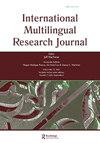The expropriation of dual language bilingual education: deconstructing neoliberalism, whitestreaming, and English-hegemony
IF 2.1
1区 文学
Q2 EDUCATION & EDUCATIONAL RESEARCH
引用次数: 11
Abstract
ABSTRACT A growing body of research has demonstrated that neoliberal discourses have negatively impacted dual language bilingual education (DLBE) for students designated as English learners. This study uses the concept of expropriation to refer to the co-opting and dispossessing of educational resources, opportunities, and rights from language-minoritized communities, and a shift to the reframing and reuse of these resources by white English-privileged populations for their benefit. Using Utah’s DLBE model (fiftyfication, exclusion of one-teacher model, exclusion of one-way developmental bilingual education, and strict language separation policy) as a foundational expropriation reference, we evaluated which states followed this model, how they implemented it, what discourses were used, and who the beneficiaries were. Employing critical discourse analysis, we examined DLBE policy documents gathered from states’ websites across the U.S. and found that Delaware, Georgia, and Wyoming emulated Utah’s model. Findings showed discursive gentrification propelled by English-hegemonic and neoliberal forces, which benefited white English-privileged students. We posit further analyses should consider the intersection of other policies in the context of expropriation conditions.双语教育的剥夺:解构新自由主义、白人化和英语霸权
越来越多的研究表明,新自由主义话语对英语学习者的双语教育(DLBE)产生了负面影响。本研究使用“征用”的概念,指的是对语言少数群体的教育资源、机会和权利的征用和剥夺,以及白人英语特权群体为自己的利益而重新构建和再利用这些资源的转变。以犹他州的DLBE模式(五十化、排除单一教师模式、排除单向发展性双语教育和严格的语言分离政策)为基础的征用参考,我们评估了哪些州遵循了这一模式,它们是如何实施的,使用了什么话语,以及谁是受益者。采用批判性话语分析,我们检查了从美国各州网站收集的DLBE政策文件,发现特拉华州、佐治亚州和怀俄明州效仿了犹他州的模式。研究结果显示,由英语霸权和新自由主义力量推动的话语士绅化,使白人英语特权学生受益。我们认为,进一步的分析应该考虑在征收条件的背景下其他政策的交集。
本文章由计算机程序翻译,如有差异,请以英文原文为准。
求助全文
约1分钟内获得全文
求助全文
来源期刊
CiteScore
4.10
自引率
4.80%
发文量
19
期刊介绍:
The International Multilingual Research Journal (IMRJ) invites scholarly contributions with strong interdisciplinary perspectives to understand and promote bi/multilingualism, bi/multi-literacy, and linguistic democracy. The journal’s focus is on these topics as related to languages other than English as well as dialectal variations of English. It has three thematic emphases: the intersection of language and culture, the dialectics of the local and global, and comparative models within and across contexts. IMRJ is committed to promoting equity, access, and social justice in education, and to offering accessible research and policy analyses to better inform scholars, educators, students, and policy makers. IMRJ is particularly interested in scholarship grounded in interdisciplinary frameworks that offer insights from linguistics, applied linguistics, education, globalization and immigration studies, cultural psychology, linguistic and psychological anthropology, sociolinguistics, literacy studies, post-colonial studies, critical race theory, and critical theory and pedagogy. It seeks theoretical and empirical scholarship with implications for research, policy, and practice. Submissions of research articles based on quantitative, qualitative, and mixed methods are encouraged. The journal includes book reviews and two occasional sections: Perspectives and Research Notes. Perspectives allows for informed debate and exchanges on current issues and hot topics related to bi/multilingualism, bi/multi-literacy, and linguistic democracy from research, practice, and policy perspectives. Research Notes are shorter submissions that provide updates on major research projects and trends in the field.

 求助内容:
求助内容: 应助结果提醒方式:
应助结果提醒方式:


